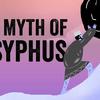3: TED Talk, "the myth of Sisyphus," 2018.
sam sax refers to himself in the poem as “sisyphus with the sissiest lips.” The ancient Greek myth of Sisyphus tells the tale of a trickster king who was punished by the gods for his hubristic belief that he was more clever than Zeus himself. Sisyphus’s punishment for his scorn of the gods, hatred of death, and passion for life was being forced to roll an immense boulder up a hill, only to have it roll down when it neared the top. Because of his earthly passions, Sisyphus was doomed to labor pointlessly, pushing the boulder up the hill for eternity, repeatedly exerting himself but accomplishing nothing. The myth has come to symbolize any task that is both futile and interminable.
Suggested Activity: Reflect on the myth of Sisyphus as it relates to the poem. Why might sax refer to himself as Sisyphus? What is the Sisyphean task the poet encounters—the fruitless labor to which he is doomed? Is it about overcoming a speech impediment? Or something else, something more? Point to specific text in the poem that may illuminate the Sisyphus reference.
Ask students to consider the effect of the heavy-handed alliteration in this part of the poem, where sax uses “sisyphus,” “sissiest,” “assassin,” “sassy,” and “passing” all in close proximity—in a poem called “Lisp.” What meaning and tension emerges from some of these juxtapositions? What images and feelings does this collection of s-heavy words evoke? Keeping this sibilance in mind, have students read the last line aloud. Why do they think sax used these particular sounds to end the poem? What do they think this ending means?
Ask students to take a few minutes to reflect on their own lives in light of the Sisyphus myth. Ask them: Do you have a Sisyphean rock? If so, what is it? If time permits, ask students to use the first letter or first sound of their name to write a short poem about their Sisyphean rock. They should use the letter or sound as much as possible throughout the poem. These do not need to be shared, but encourage students to read these aloud (in public or private) and to reflect on the feeling of speaking their name-sound over and over.
Source: Alex Gendler, "The myth of Sisyphus," filmed November 2018, TED-ed, 4:56, https://www.ted.com/talks/alex_gendler_the_myth_of_sisyphus#t-1180.

